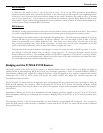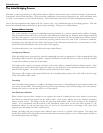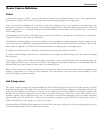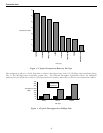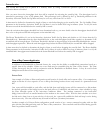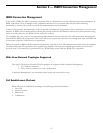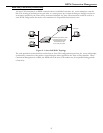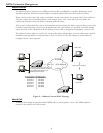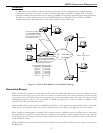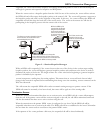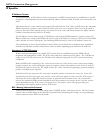
Introduction
21
Multipoint
A simple Multipoint configuration would consist of a head office and two remote offices. Cost comparisons might
reveal that it is less expensive to use a dial-up line during business hours only instead of a permanent leased line.
One router will be installed at each office (for a total of three units). Each router at the remote office locations will
connect to a separate link on the router at the head office. The link from each bridge/router will be connected to a
dial modem. Set the link operation of both links on the bridge/router at the head office to Conditional, and then
enter a time schedule for each link by using the Time Schedule option of the Link Activation Conditions Menu. The
modems connected to the head-office bridge/router will each have an autodial number of one of the modems at the
remote offices. With the time schedule set to have the link active from 8 am to 6 pm each day of the week, the
router will establish the link and keep it active during those hours only.
Disaster Recovery Backup Link
Each Single Active Link router has the ability to activate a secondary link when the main link fails. This secondary link may
be connected to a dial-up modem or ISDN service, so it can be used if something should happen to the main link. The
secondary link is available only for a disaster-recovery situation.
ISDN Single Active Link & Dual Active Link
On Single Active Link ISDN Routers, when the WAN Environment option is set to Multipoint, only ISDN call 1 is
available; ISDN call 2 is disabled. A Single Active Link ISDN router will be able to use both ISDN calls to connect in a
Point-to-Point topology to another ISDN router.
On Dual Active Link ISDN Routers, the WAN Environment option may be set to either Point-to-Point or Multipoint. Both
ISDN calls may be used to connect to the same ISDN router or to two other ISDN routers.
Operating Software Upgrades
The router includes flash memory, that allows new system code to be downloaded using the Trivial File Transfer Protocol
(TFTP). This allows software updates to be performed quickly and painlessly from a host server (with TFTP capabilities) on
the network.
The Router also allows the downloading of software updates by using a direct management port connection and the
ZMODEM transfer protocol.



